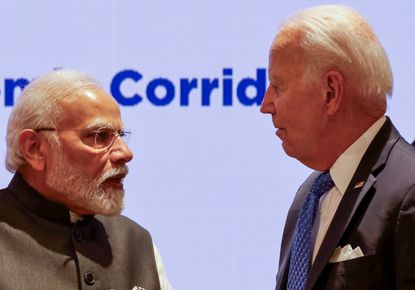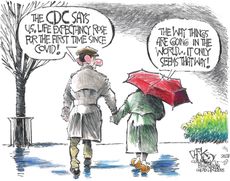Alleged Sikh assassination plot rocks US-India relations
By accusing an Indian government official of orchestrating an assassination attempt on a US citizen in New York, the Justice Department risks a diplomatic crisis between two superpowers


For the second time this year, a diplomatic scandal is brewing between India and a Western nation over allegations of a government-directed assassination attempt on foreign soil. Less than three months after Canadian Prime Minister Justin Trudeau notified his parliament of "a potential link between agents of the government of India and the killing of a Canadian citizen, Hardeep Singh Nijjar," the United States Justice Department this week announced murder-for-hire charges against an Indian national who prosecutors claim was directed by Indian government officials to kill an American citizen in New York City. As was in the case of the successful assassination in Canada, this latest intended victim was, per the Justice Department, a "vocal critic of the Indian government" and "advocates for the secession of Punjab, a state in northern India that is home to a large population of Sikhs." According to the Justice Department, not only was the intended victim an acquaintance of Nijjar, but the would-be assassin allegedly claimed that Nijjar's death in September meant there was "now no need to wait" to move forward with his own (ultimately foiled) operation.
Beyond the similarities between the two operations, the DOJ's announcement of an alleged foreign assassination plot has raised the prospect of a comparable diplomatic rift between the U.S. and India as that which Canada experienced this past fall. As Bloomberg columnist Bobby Ghosh told PBS News Hour in September, President Joe Biden was already in a "really, really, really awkward position" balancing U.S.-India and U.S.-Canada relations. Now, with a new alleged assassination plot in America itself, where do India and the United States go from here?
Drawing lines in the sand
The U.S. first became aware of the developing assassination plot in July, according to an unnamed senior White House official who spoke with The Associated Press. After learning of the operation, the official claimed, White House National Security Adviser Jake Sullivan met with his Indian counterpart and stressed that India "needed to investigate and hold those responsible accountable." Sullivan also allegedly demanded "an assurance that this would not happen again" and warned that another such incident "could permanently damage the trust established between our two countries." That message was reportedly reiterated by CIA Director William Burns, and Biden himself, who "raised the matter directly" with Indian Prime Minister Narendra Modi in September.
Subscribe to The Week
Escape your echo chamber. Get the facts behind the news, plus analysis from multiple perspectives.

Sign up for The Week's Free Newsletters
From our morning news briefing to a weekly Good News Newsletter, get the best of The Week delivered directly to your inbox.
From our morning news briefing to a weekly Good News Newsletter, get the best of The Week delivered directly to your inbox.
Ties between the U.S. and India may face "their biggest test in recent years" the AP's Krutika Pathi wrote, predicting that both governments "may struggle to control the narrative and the fallout" even if bigger, more long-term damage is "unlikely." Michael Kugelman, director of the Wilson Center’s South Asia Institute, agreed, telling The Washington Post that America's "relationship with India is a special case" thanks to efforts to counterbalance China's influence in the region. As proof, Kugelman noted that even after learning of the plot, the Biden administration "didn’t scale down engagement with India" over the summer, and "high-level meetings went on as scheduled." Even so, the plot could still threaten to "complicate relations among the United States, Canada and India" and "hurt President Biden's efforts to cultivate Indian leaders in a bid to counter the global influence of China and Russia," according to The New York Times.
A 'burning question'
"Why would the Indian government take such a gamble?," asked The New York Times' Mujib Mashal and Hari Kumar, calling it the "burning question" left unanswered by the Justice Department's charges. While the United States' "intense courtship" of India may give that country the impression "that there is little it could do to rupture ties," some speculate the plot was either conducted by a rogue element within the Indian government, or done "with an eye on India’s domestic political calendar" in which Modhi is working to shore up his reputation as a strongman leader. That there have been months of behind-the-scenes dialogue, rather than a public schism "suggests it may be just a wrinkle in the relationship" with some diplomatic circles believing "U.S. officials could have information to suggest that the plot did not go far up the chain in India."
India has vowed "necessary follow-up action" following the allegations, with government spokesperson Arindam Bagchi calling the charges "contrary to government policy," according to Reuters.

Continue reading for free
We hope you're enjoying The Week's refreshingly open-minded journalism.
Subscribed to The Week? Register your account with the same email as your subscription.
Sign up to our 10 Things You Need to Know Today newsletter
A free daily digest of the biggest news stories of the day - and the best features from our website
Rafi Schwartz has worked as a politics writer at The Week since 2022, where he covers elections, Congress and the White House. He was previously a contributing writer with Mic focusing largely on politics, a senior writer with Splinter News, a staff writer for Fusion's news lab, and the managing editor of Heeb Magazine, a Jewish life and culture publication. Rafi's work has appeared in Rolling Stone, GOOD and The Forward, among others.
-
 Today's political cartoons - December 3, 2023
Today's political cartoons - December 3, 2023Cartoons Sunday's cartoons - life expectancy goes up, Kissinger goes down, and more
By The Week US Published
-
 10 things you need to know today: December 3, 2023
10 things you need to know today: December 3, 2023Daily Briefing Gaza residents flee as Israel continues bombardment, Trump tells supporters to 'guard the vote' in Democratic cities, and more
By Justin Klawans, The Week US Published
-
 5 X-plosive cartoons about Elon Musk
5 X-plosive cartoons about Elon MuskCartoons Artists take on his proposed clean-up of X, his views on advertisers, and more
By The Week US Published
-
 Worklessness: a national 'scandal'
Worklessness: a national 'scandal'Talking Point One in five working-age adults in Birmingham, Glasgow and Liverpool are neither in work nor seeking work
By The Week UK Published
-
 'In Ukraine, sadly, promises are hard to keep'
'In Ukraine, sadly, promises are hard to keep'Instant Opinion Opinion, comment and editorials of the day
By Harold Maass, The Week US Published
-
 Dublin riots: a blow to Ireland’s reputation
Dublin riots: a blow to Ireland’s reputationTalking Point Unrest shines a spotlight on Ireland's experience of mass migration
By The Week UK Published
-
 'This migrant crisis is not unlike problems we've faced before'
'This migrant crisis is not unlike problems we've faced before'Instant Opinion Opinion, comment and editorials of the day
By Harold Maass, The Week US Published
-
 Henry Kissinger dies aged 100: a complicated legacy?
Henry Kissinger dies aged 100: a complicated legacy?Talking Point Top US diplomat and Nobel Peace Prize winner remembered as both foreign policy genius and war criminal
By Harriet Marsden, The Week UK Last updated
-
 The Supreme Court could reign in the SEC — and federal agencies as a whole
The Supreme Court could reign in the SEC — and federal agencies as a wholeTalking Point The court is hearing arguments on the agency's ability to enforce financial penalties
By Justin Klawans, The Week US Published
-
 Is Nikki Haley's Koch network endorsement the shake-up the GOP primary has been waiting for?
Is Nikki Haley's Koch network endorsement the shake-up the GOP primary has been waiting for?Today's big question By throwing its weight behind the insurgent former UN ambassador, the conservative PAC hopes to tilt the scales against Trump
By Rafi Schwartz, The Week US Published
-
 'Carbon taxes are all pain with no gain'
'Carbon taxes are all pain with no gain'Instant Opinion Opinion, comment and editorials of the day
By Harold Maass, The Week US Published










